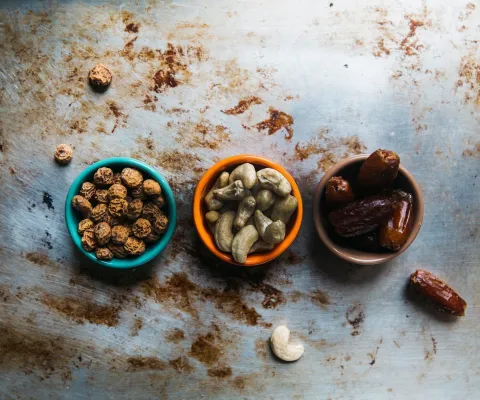With exams about to get underway for many people this is a tiring and stressful time of year. To help brains stay sharp and energised, here are our top tips to fuel the body and brain, stimulate your learning and memory, and give you an edge as you prepare for your exams.
1. Eat breakfast
That’s right, no substituting coffee for breakfast this time! Research shows that eating breakfast can help improve concentration, memory, and recall.
Taking just ten minutes to eat something nourishing for breakfast can help keep you focused while you study and help reduce irritability and brain fog in the lead up to an exam. Focussing on wholegrains will help keep you full for longer and ensure a steady supply of blood glucose to fuel your brain. Try some overnight oats, peanut butter and banana on toast, or grab a bowl of cereal to fuel your body as well as your brain.
For more inspiration, take a look at our quick and easy breakfast recipes.
2. Don’t skip meals
Did you know that skipping meals can lower your serotonin levels? Serotonin, also known as one of the ‘happy hormones’ is a brain chemical that helps regulate mood and promote feelings of calm and wellbeing. To support your body in producing serotonin, include protein food sources that are rich in tryptophan. These include meat, eggs, dairy, fish, nuts and pulses, lentils and dried beans. Tryptophan is an ‘essential’ amino acid that your body can’t make so you need to get it through food. It is used to produce serotonin (and melatonin).
Complex carbohydrates (such as wholegrain bread, pasta, rice, oats, potatoes) stimulate insulin release. This helps clear amino acids from the blood that might compete with tryptophan for uptake, this means tryptophan can cross the blood-brain barrier and get converted to serotonin and help support optimal brain function.
Try these combos:
- Yogurt with granola and chia seeds or overnight oats
- Wholegrain toast with cheese
- Pesto eggs with wholegrain toast
- A lentil and sweet potato curry with brown rice
- A fruit smoothie with oats, yogurt and fruit
3. Stock up on gum
Yes, really! Chewing gum has been linked to improved alertness and lower levels of stress, anxiety and depression. This is because the act of chewing increases blood flow to the brain and activates areas of the brain linked to learning and memory.
So, if you need a concentration boost during your exam preparation, get chewing! Choose a sugar-free variety to reduce dental plaque.
4. Eat the rainbow
Stress - the ‘fight or flight’ response you get when you’re under pressure that can often leave you feeling a bit nauseous, or like you have ‘butterflies’ in your stomach. It’s important to still have nourishing meals (even if you don’t feel hungry), to help your brain function to its full potential.
Stress can deplete your vitamins and minerals, including B vitamins (such as folate), antioxidants (vitamins A, C and E), and zinc. You can increase your daily intake of essential nutrients by eating a more colourful variety of foods including;
- Fruits and vegetables like oranges, berries, melons, carrots, pumpkin, broccoli, spinach, tomatoes and capsicum
- Wholegrains like grainy bread, oats, brown rice, quinoa, buckwheat and corn
- Healthy fats like avocado, nuts, seeds, salmon, tuna and olive oil
- Lean proteins like chicken, seafood, eggs, tofu, and legumes
- Dairy foods like milk, yogurt and cheese
Take the Healthy Eating Quiz to see where you can improve your diet!
5. Drink more water
Did you know that up to 75% of your brain is water? While it’s always important to stay hydrated, it’s even more so during exams to ensure your brain is functioning at full capacity. Being only slightly dehydrated can significantly impact your alertness, short-term memory and ability to concentrate. To keep your hydration and performance at peak levels, aim to drink around 2 litres (about 8 glasses) of water each day. A good indicator of hydration is the colour of your urine – you want your urine to be the colour of straw.
A small amount of caffeine may be helpful during exam periods where caffeine in doses of up to 300mg (or about 2-3 shots of espresso) is associated with enhanced cognitive function including increased alertness, attention and reaction time.
Larger doses of caffeine can cause a number of adverse effects such as jitters, anxiousness, insomnia, and stomach upset which may hinder exam performance. Remember that caffeine can be found not only in coffee, but also in tea, cola drinks, energy drinks and even dark chocolate.
Of interest is that in tea, the stimulating effect of caffeine is dampened down by an amino acid called L-theanine which has also been shown to boost brain activity. A review of research on the effect of tea on mood and brain function found that it can increase alertness and some aspects of reaction time and accuracy for up to a couple of hours after drinking it.
Try to avoid caffeinated drinks, which includes energy drinks, for at least 6 hours before bed to ensure you get a good night’s rest.
6. Get moving
That’s right, it’s time to get out of that dark room and breathe in some fresh air! Fight fatigue by swapping your books for joggers and getting some exercise into your day.
This will keep the blood and nutrients circulating to your brain, giving you the boost you need to keep going! Make sure you get a good night’s sleep before exam day and give yourself plenty of time to refuel before putting your brain to the test.
Nutrition is one of your most powerful tools during exam season. By eating regularly, staying hydrated, and moving your body, you’ll give yourself the best chance to feel energised, focused, and confident.
- Make sure you check out our Top meals to get you through exams
- Listen to the Nutrition Science Bites conversation with Prof Clare Collins and Ilyse Jones about: Can Food and Nutrition help with Exam performance? #SpoilerAlert YES













